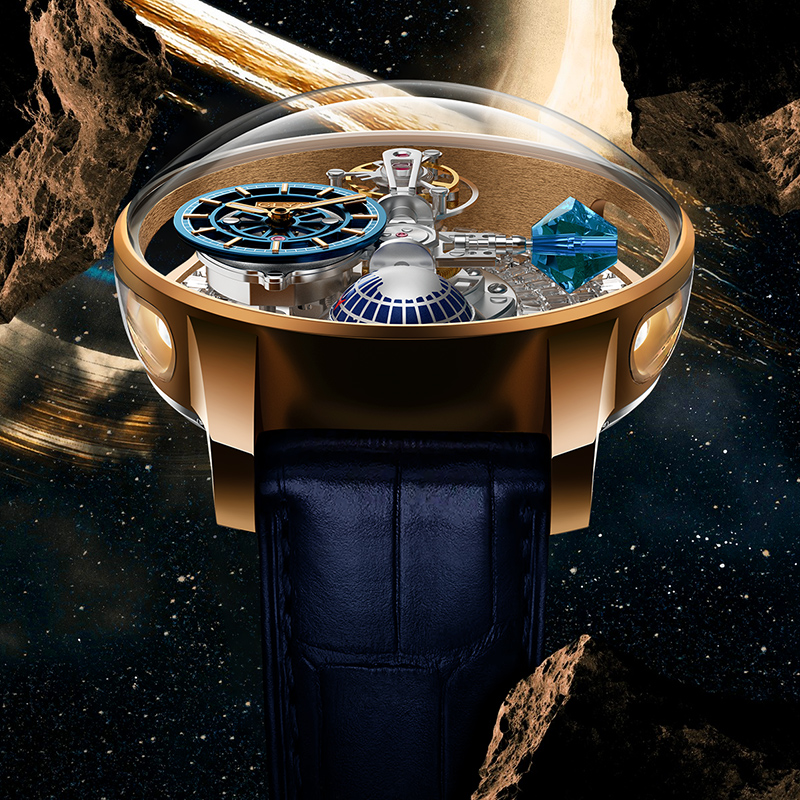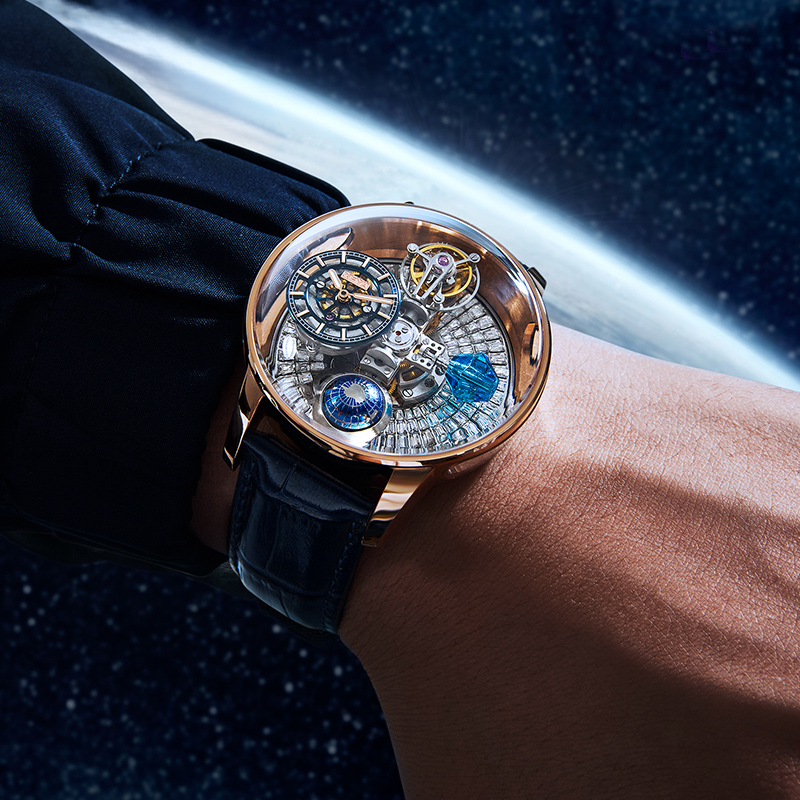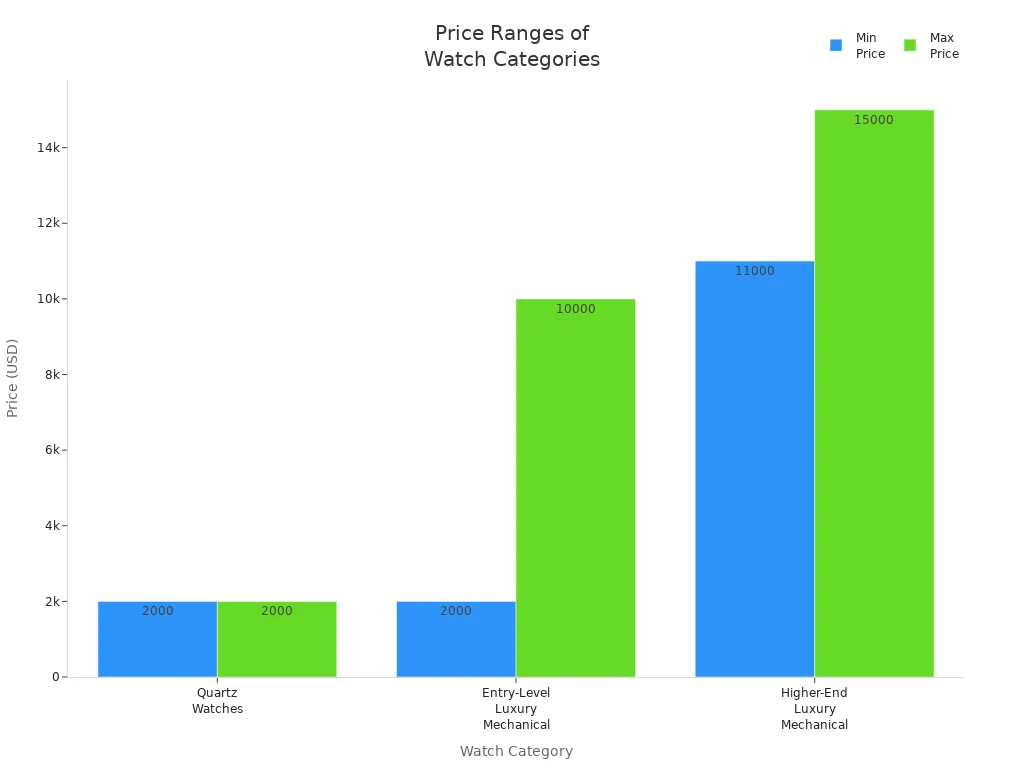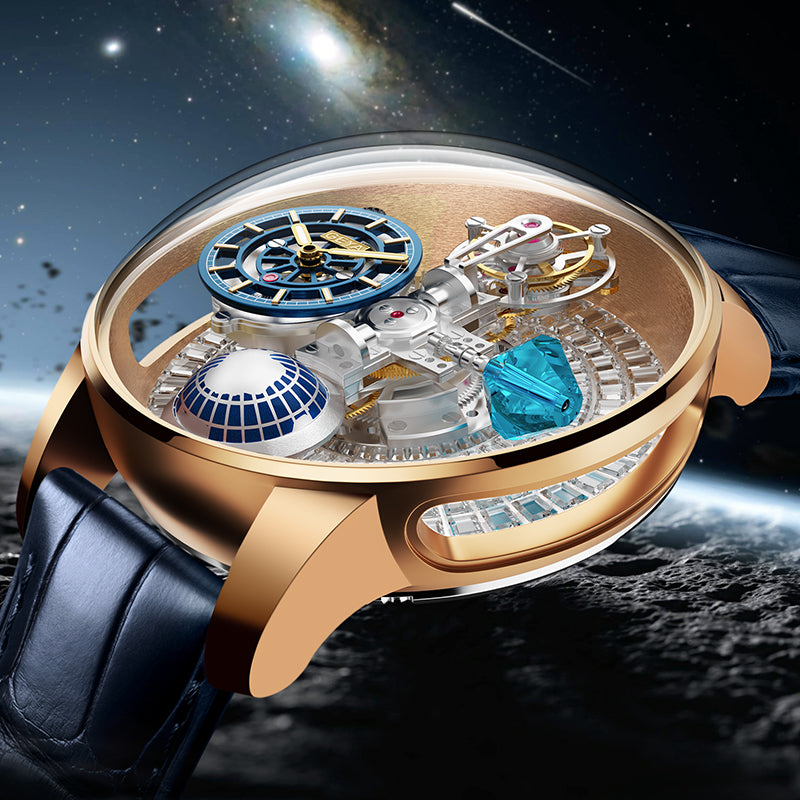When I compare mechanical and quartz watches, I see clear trade-offs. Mechanical watches showcase intricate engineering and a عقرب الثواني المتحرك بسلاسة, والتي يعجب بها العديد من الجامعين لفنها وتقاليدها. تستخدم ساعات الكوارتز بلورات تعمل بالبطارية، مما يوفر دقة لا مثيل لها وصيانة قليلة. اليوم، تشكل الساعات الميكانيكية حوالي 55% من السوق العالمية، في حين أن نماذج الكوارتز هيمن على السوق الجماهيري. الساعة المناسبة تعتمد على ما إذا كنت تقدر التراث والحرفية أو تفضل الدقة والراحة.

النقاط الرئيسية
-
تُظهر الساعات الميكانيكية الحرفية الماهرة والتقاليد من خلال الأجزاء المعقدة التي تعمل معًا بدون بطاريات.
-
تستخدم ساعات الكوارتز بلورات تعمل بالبطارية للحفاظ على وقت دقيق جدًا مع الحد الأدنى من الصيانة.
-
تحتاج الساعات الميكانيكية إلى صيانة منتظمة وتعامل دقيق، لكنها يمكن أن تدوم لأجيال وقد تزيد في القيمة.
-
تقدم ساعات الكوارتز دقة عالية، وأسعار معقولة، ومتانة، مما يجعلها مثالية للاستخدام اليومي وأنماط الحياة النشطة.
-
اختر ساعة بناءً على نمط حياتك وميزانيتك، وما إذا كنت تقدر التراث والفن أو الدقة والراحة.
أساسيات الساعات الميكانيكية

كيف تعمل الساعات الميكانيكية
عندما أفحص ساعة ميكانيكية، أرى معجزة في الهندسة. قلب كل ساعة ميكانيكية هو حركتها، والتي تتكون من العديد من الأجزاء الصغيرة والمعقدة التي تعمل بتناغم. الـ الزنبرك الرئيسي, لفافة معدنية مشدودة بإحكام، تخزن الطاقة عندما أقوم بلف التاج. تُطلق هذه الطاقة ببطء من خلال سلسلة من التروس والرافعات. آلية الهروب، المرتبطة بعجلة التوازن، تنظم تدفق الطاقة وتضمن أن الساعة تدق بمعدل ثابت. على عكس الطرازات الكوارتز، الساعات الميكانيكية لا تستخدم البطاريات أو الإلكترونيات. تعتمد بالكامل على الطاقة الميكانيكية، مما يمنحها طابعًا فريدًا وعقرب ثواني متحرك بسلاسة يعشقه العديد من الهواة.
ملاحظة: تتطلب الساعات الميكانيكية صيانة منتظمة للحفاظ على دقتها وأدائها. أنا أقدر الحرفية والتقاليد وراء كل قطعة، رغم أنها قد لا تضاهي دقة ساعات الكوارتز.
الأنواع: يدوي مقابل أوتوماتيكي
Mechanical watches come in two main types: manual and automatic. I find that تتطلب الساعات اليدوية مني لف التاج كل يوم أو يومين. هذا الطقس يخلق صلة شخصية مع الساعة ويساعدني على تقدير آلية عملها الداخلية. غالبًا ما تكون الساعات اليدوية ذات تصميم أنحف لأنها تفتقر إلى دوار التعبئة الذاتية الموجود في الساعات الأوتوماتيكية.
تستخدم الساعات الأوتوماتيكية، من ناحية أخرى، دوارًا يقوم بلف الزنبرك الرئيسي أثناء تحريك معصمي طوال اليوم. تجعل هذه الميزة استخدامها أكثر راحة للارتداء اليومي، حيث لا أحتاج إلى لفها يدويًا إذا ارتديتها بانتظام. تميل الساعات الأوتوماتيكية إلى أن تكون أكثر سمكًا بسبب الدوار، لكنها توفر سهولة أكبر في الاستخدام وتناسب نمط الحياة النشط.
-
تجذب الساعات اليدوية أولئك الذين يقدرون التقاليد ويستمتعون بالتجربة العملية.
-
تعتبر الساعات الأوتوماتيكية مثالية لأولئك الذين يفضلون الراحة وقلة الصيانة.
كلا النوعين يتطلب صيانة كل بضع سنوات، لكن اختياري يعتمد على مدى رغبتي في التفاعل مع ساعتي وما أقدره أكثر في الساعة.
إيجابيات وسلبيات الساعة الميكانيكية
مزايا الساعة الميكانيكية
عندما أفكر في مزايا الساعات الميكانيكية، تبرز عدة نقاط رئيسية. غالبًا ما يبرز الهواة والخبراء هذه الفوائد:
-
الحرفية والفن
أُعجب بالعمل المعقد الذي يُبذل في كل ساعة ميكانيكية. يقوم صانعو الساعات المهرة بتجميع مئات من المكونات الصغيرة يدويًا، يصنعون ساعات تجمع بين الوظائف والجمال البصري. -
طول العمر
مع العناية المناسبة والصيانة الدورية، يمكن للساعة الميكانيكية أن تدوم لأجيال. لقد رأيت نماذج قديمة من عقود مضت لا تزال تعمل بسلاسة، مما يبرز إمكانيتها لتصبح إرثًا عائليًا. -
الدقة
على الرغم من أنها ليست دقيقة مثل الكوارتز، إلا أن الساعات الميكانيكية تحافظ على الوقت بدقة تصل إلى بضع ثوانٍ في اليوم. هذا المستوى من الدقة يبرز دقة حركاتها المعقدة. -
التعقيد والجاذبية
تناغم التروس، الهروب، وعجلة التوازن يثير إعجابي. غالبًا ما يقدّر الجامعون الهندسة والحركة المرئية من خلال ظهر العلبة. -
قيمة الاستثمار
العديد من الساعات الميكانيكية، خاصة الإصدارات المحدودة، يمكن أن تزيد قيمتها مع مرور الوقت. أنا أراها ليس فقط كإكسسوارات بل كاستثمارات محتملة. -
الجماليات والأسلوب
تعمل الساعات الميكانيكية كأدوات لقياس الوقت وأعمال فنية في آن واحد. تصاميمها المتقنة وموادها تجذب مجموعة واسعة من الأذواق.
-
أنا أيضًا أستمتع بـ حركة ناعمة وانسيابية لعقرب الثواني، مما يميز الساعات الميكانيكية عن نماذج الكوارتز. تضيف هذه الميزة أناقة وتشير إلى وجود حركة ميكانيكية حقيقية.
-
الساعات الميكانيكية لا تحتاج إلى بطاريات. أجد هذا الجانب مستدامًا ومريحًا في نفس الوقت، حيث لا أقلق أبدًا بشأن استبدال البطاريات.
-
الإحساس بالفخامة قوي مع الساعات الميكانيكية. حتى الطرازات الأساسية تحمل شعورًا بالمكانة والتقاليد.
Note: The التقاليد والحنين إلى الماضي المرتبطة بالساعات الميكانيكية تضيف إلى جاذبيتها. يستمتع العديد من الجامعين، بمن فيهم أنا، ببناء مجموعات واستكشاف علامات تجارية ونماذج مختلفة.
عيوب الساعة الميكانيكية
على الرغم من العديد من مزاياها، إلا أن الساعات الميكانيكية تأتي مع بعض العيوب التي أضعها دائمًا في الاعتبار قبل الشراء.
-
The التعقيد والهندسة الدقيقة يتطلب مني التعامل مع ساعتي بعناية. أحتاج إلى فهم طريقة تشغيلها وتجنب تعريضها للصدمات أو المجالات المغناطيسية.
-
إذا لم أرتدِ ساعتي الأوتوماتيكية بانتظام، فقد تتوقف عن العمل. هذا الاعتماد على حركة المعصم يعني أنني يجب أن أقوم بلفها أو استخدام جهاز لف الساعات للحفاظ على عملها.
-
الساعات الميكانيكية عرضة للصدمات. يمكن أن يؤدي تأثير قوي إلى إزاحة مكونات داخلية، مما يؤثر على الدقة أو يسبب تلفًا.
-
مع مرور الوقت، يؤدي الاحتكاك بين الأجزاء الصغيرة إلى التآكل والتمزق. يجب أن أحدد موعدًا الصيانة الدورية كل ثلاث إلى خمس سنوات للحفاظ على حركة سلسة ودقيقة.
-
يمكن أن تكون عمليات الإصلاح والصيانة مكلفة. يجب أن يتولى صانعو الساعات المهرة الإصلاحات المعقدة، مما يزيد من التكلفة.
-
تنتج الساعات الأوتوماتيكية أحيانًا ضوضاء الدوار بسبب الأجزاء المتحركة بالداخل. لقد لاحظت أن هذه الطرازات يمكن أن تكون أيضًا أكثر ضخامًة من ساعات التعبئة اليدوية.
نصيحة: الساعات الميكانيكية تتطلب صيانة أكثر تواترًا وتفصيلاً من نماذج الكوارتز. أوصي بالتخطيط للصيانة الدورية لضمان طول العمر والأداء.
أساسيات ساعة الكوارتز

كيف تعمل ساعات الكوارتز
عندما أنظر إلى ساعة كوارتز، أرى مزيجًا من العلم والبساطة. يكمن جوهر عملها في الخصائص الفريدة لبلورات الكوارتز. تهتز هذه البلورات بتردد دقيق عندما يمر التيار الكهربائي من خلالها، وهي ظاهرة تعرف بـ تأثير الضغط الكهربائي. تشكل هذه العملية أساس توقيت الكوارتز.
|
الجانب |
Arabic تفسير |
|---|---|
|
التأثير الكهروضغطي |
تتشوه بلورات الكوارتز عند تطبيق شحنة كهربائية، مما يجعلها تتذبذب بتردد دقيق (عادة 32,768 هرتز). |
|
تردد التذبذب |
تردد الاهتزاز المستقر للكوارتز يتأثر بدرجة أقل بدرجة الحرارة والاضطرابات الميكانيكية، مما يضمن الدقة. |
|
الدائرة الإلكترونية |
يقوم دائرة المذبذب بتضخيم وتصفية اهتزازات بلورة الكوارتز للحفاظ على تردد ثابت. |
|
تقسيم التردد |
يتم تقسيم تردد التذبذب بواسطة دائرة متكاملة لإنتاج نبضة كهربائية بتردد 1 هرتز. |
|
آلية القيادة |
ينقل نبض 1 هرتز طاقة إلى محرك خطوة يحرك عقارب الساعة للحفاظ على دقة الوقت. |
|
ثبات درجة الحرارة |
تظل تردد الرنين للكريستال الكوارتز ثابتًا على الرغم من تغيرات درجة الحرارة، مما يحسن دقة قياس الوقت مقارنة بالساعات الميكانيكية. |
أجد عملية الخطوة بخطوة مثيرة للاهتمام:
-
أطبق الكهرباء على بلورة الكوارتز، التي تهتز عند 32,768 مرة في الثانية.
-
يقوم الدائرة المتكاملة بتقسيم هذا الإشارة عالية التردد إلى نبضة واحدة في الثانية.
-
يقوم الدائرة بتضخيم الإشارة الكهربائية الضعيفة.
-
الإشارة المضخمة تحرك محرك خطوة، الذي يدور مع كل نبضة.
-
ينتقل حركة المحرك عبر التروس، مما يحرك العقارب ويعرض الوقت.
تمنح هذه التقنية ساعات الكوارتز ميزة واضحة في الدقة. تحقق ساعات الكوارتز دقة أعلى لأن تردد اهتزاز بلورة الكوارتز يظل ثابتًا، مدعومًا ببطارية. تنحرف معظم نماذج الكوارتز بحوالي فقط ±15 ثانية في الشهر. بالمقابل، يمكن للساعات الميكانيكية أن تختلف بمقدار ±2 إلى ±60 ثانية في اليوم بسبب عوامل بيئية مثل درجة الحرارة والمغناطيسية. لقد شاهدت هذا الفرق بنفسي عند مقارنة ساعتي الخاصة.
|
نوع الساعة |
مصدر الطاقة |
الانحراف النموذجي للدقة |
فترة القياس |
|---|---|---|---|
|
ساعات كوارتز |
بطارية + بلورة كوارتز |
شهر واحد |
|
|
الساعات الميكانيكية |
الزنبرك الرئيسي + عجلة التوازن |
±2 إلى ±60 ثانية |
1 يوم |
ملاحظة: تضمن استقرار بلورات الكوارتز أن ساعات الكوارتز تحتاج إلى تعديل أقل تواترًا وتوفر دقة في الوقت موثوقة للاستخدام اليومي.
مزايا وعيوب ساعة الكوارتز
مزايا ساعة الكوارتز
عندما أقوم بتقييم ساعات الكوارتز، أرى عدة مزايا قوية تجعلها جذابة للعديد من الناس:
-
استثنائي الدقة
تحافظ ساعات الكوارتز على الوقت بدقة ملحوظة. يهتز بلور الكوارتز بتردد ثابت، لذلك نادراً ما أحتاج إلى ضبط الوقت. تفقد معظم الطرازات أو تكسب بضع ثوانٍ فقط كل شهر، وهو ما يتفوق بكثير على دقة الساعات الميكانيكية. -
القدرة على التحمل
ألاحظ أن ساعات الكوارتز تكلف أقل بكثير من الساعات الميكانيكية. يستخدم المصنعون الإنتاج الآلي والبناء البسيط، مما يخفض السعر. هذا يجعل ساعات الكوارتز في متناول مجموعة واسعة من المشترين. -
صيانة منخفضة
أقدر قلة الصيانة المطلوبة. عادةً ما تتضمن الصيانة استبدال البطارية كل بضع سنوات فقط. لا أحتاج إلى القلق بشأن الصيانة الدورية أو التزييت كما هو الحال مع الساعة الميكانيكية. -
المتانة والموثوقية
تحتوي ساعات الكوارتز على عدد أقل من الأجزاء المتحركة. هذا التصميم يجعلها أكثر مقاومة للصدمات وتغيرات الحرارة. أجدها موثوقة للاستخدام اليومي، ونادراً ما تحتاج إلى إصلاحات. -
عمر بطارية طويل
تستخدم معظم ساعات الكوارتز بطاريات ليثيوم أو بطاريات زر تدوم بين من 2 إلى 5 سنوات. بعض الطرازات الراقية يمكنها العمل حتى 10 سنوات على بطارية واحدة. أوصي باستبدال البطارية كل بضع سنوات للحفاظ على عمل الساعة بسلاسة. -
عملي للاستخدام الرياضي والمهني
نظرًا لدقتها وموثوقيتها، تعتبر ساعات الكوارتز مثالية لتوقيت الأحداث الرياضية أو الأنشطة المهنية التي تتطلب قياسًا دقيقًا.
نصيحة: إذا كنت تريد ساعة يمكنك ضبطها ونسيانها، فإن الساعة الكوارتز توفر راحة لا مثيل لها وطمأنينة.
عيوب ساعة الكوارتز
على الرغم من العديد من مزاياها، إلا أن ساعات الكوارتز لها بعض العيوب التي أضعها في الاعتبار قبل الشراء:
-
اعتماد البطارية
تعتمد ساعات الكوارتز على البطاريات. عندما تنفد البطارية، تتوقف الساعة عن العمل. يجب أن أتذكر استبدال البطارية كل بضع سنوات، أو أخاطر بالتآكل إذا تسربت البطارية الميتة. -
مشاكل الحزام والسوار
يبلغ العديد من المستخدمين عن مشاكل في جودة الأحزمة والأساور، خاصة في الطرازات ذات الأسعار المنخفضة. لقد رأيت أحزمة مطاطية تتدهور وتنكسر مع مرور الوقت. بعض الأساور المعدنية يصعب تعديل حجمها أو ضبطها، مما قد يكون محبطًا. -
عمر محدود وقيمة عاطفية
بينما تعتبر ساعات الكوارتز موثوقة، نادرًا ما تصبح إرثًا عائليًا. أجد أن معظم الناس لا يورثونها عبر الأجيال، على عكس الساعات الميكانيكية. -
الأعطال الإلكترونية
يمكن أن تتعرض ساعات الكوارتز لأضرار في لوحة الدائرة، أو تآكل في التاج أو العمود، ومشاكل في شاشة الكريستال السائل في الطرازات الرقمية. إذا تعطل الحركة، غالبًا ما أجد أنه من الأسهل والأرخص استبدال الحركة بأكملها بدلاً من إصلاحها. -
جاذبية أقل ميكانيكية
بالنسبة لأولئك الذين يستمتعون بفن وتقاليد صناعة الساعات، قد تبدو الساعات الكوارتز أقل تميزًا. لا أشعر بنفس الإحساس بالحرفية أو الارتباط كما هو الحال مع الساعة الميكانيكية.
ملاحظة: معظم الشكاوى حول ساعات الكوارتز تركز على الأجزاء الخارجية مثل الأحزمة وأشرطة الزنبرك، وليس على الحركة نفسها. الآلية الداخلية تظل موثوقة للغاية.
مقارنة الساعات
الدقة والصيانة
عندما أقارن الدقة، تبرز ساعات الكوارتز. معظم نماذج الكوارتز تنحرف فقط ±15 ثانية في الشهر. بعض الحركات المتقدمة للكوارتز، مثل Citizen Caliber 0100، تصل إلى ±1 ثانية في السنة. عادةً ما تتراوح الساعات الميكانيكية، حتى الفاخرة منها، بين -1 إلى +10 ثوانٍ في اليوم. ساعة Zenith Defy Lab، وهي نموذج ميكانيكي رفيع المستوى، تحقق دقة ±0.3 ثانية في اليوم، لكن هذا لا يزال نادرًا.
|
نوع الساعة |
معدل الدقة |
ملاحظات |
|---|---|---|
|
الساعات الميكانيكية |
-1 إلى +10 ثوانٍ/يوم |
يختلف حسب الطراز والبيئة |
|
ميكانيكي فاخر |
±0.3 ثانية/يوم |
مثال: زينيث ديفاي لاب |
|
كوارتز نموذجي |
±15 ثانية/شهر |
دقة الكوارتز القياسية |
|
كوارتز متقدم |
±10 ثانية/سنة |
مثال: بريتلينغ سوبركوارترز |
|
كوارتز فائق الدقة |
±1 ثانية/سنة |
مثال: Citizen Caliber 0100 |
الصيانة تختلف أيضًا. أجد أن الساعات الميكانيكية تتطلب صيانة منتظمة كل 3-5 سنوات، مع تكاليف تتراوح من 250 دولارًا إلى أكثر من 1,000 دولار اعتمادًا على العلامة التجارية والتعقيد. تحتاج ساعات الكوارتز فقط إلى استبدال البطارية والصيانة العرضية، والتي عادةً ما تكلف $20 إلى $150قد تكلف نماذج الكوارتز الفاخرة أكثر، لكنها لا تزال أقل تكلفة من عمليات إصلاح الميكانيكية.
التكلفة والقيمة
غالبًا ما تحمل الساعات الميكانيكية علامات أسعار أعلىتبدأ نماذج الساعات الميكانيكية الفاخرة للمبتدئين من حوالي 2000 دولار ويمكن أن تصل إلى 10000 دولار. تبدأ العلامات التجارية الراقية مثل باتيك فيليب أو أوديمار بيجيه من 11000 دولار وتصل إلى أسعار أعلى بكثير. تظل الساعات الكوارتز أكثر تكلفة، مع توفر العديد من النماذج ذات الجودة تحت 2000 دولار. يعكس هذا الفارق السعري الحرفية وتعقيد الحركات الميكانيكية.

يمكن للساعات الميكانيكية أن تحتفظ بقيمتها أو تزيدها، خاصة الإصدارات المحدودة أو النماذج الأيقونية. نادرًا ما ترتفع قيمة الساعات الكوارتز، لكنها تقدم قيمة ممتازة للاستخدام اليومي والموثوقية.
الأسلوب والتجربة
تُبرز الساعات الميكانيكية الفن والتقاليد. أرى اتجاهات مثل مقاييس الهيكل العظمي، أحجام علب أصغر، ومواد فريدة مثل السيراميك وألياف الكربون. تركز العديد من العلامات التجارية على التراث، مع تعقيدات كلاسيكية وتصاميم مستوحاة من الطراز القديم. ارتداء ساعة ميكانيكية يشعرني بالتميز، ويربطني بالتاريخ والحرفية وراء كل قطعة.
ساعات الكوارتز تطورت في التصميم والتقنية. تقدم العلامات التجارية الآن يعمل بالطاقة الشمسية, دقيقة للغاية، ونماذج كوارتز محدودة الإصدار. ألاحظ أن ساعات الكوارتز تجذب أولئك الذين يرغبون في تصميم حديث، والعملية، والأسعار المعقولة. يختار العديد من المشترين بناءً على المظهر بدلاً من نوع الحركة. بينما تتفوق ساعات الكوارتز في الراحة، يشعر بعض المستخدمين أنها يفتقر إلى القيمة العاطفية من قطع ميكانيكية.
نصيحة: إذا كنت تبحث عن ساعة ذات قيمة عاطفية دائمة وتقاليد، فإن الساعات الميكانيكية تقدم تجربة فريدة. من ناحية الدقة والسهولة، تظل الساعات الكوارتز الخيار العملي.
اختيار ساعتك
عوامل نمط الحياة
عندما أختار ساعة، أراعي دائمًا كيف تتناسب مع روتيني اليومي وأنشطتي. تتطلب أنماط الحياة المختلفة ميزات مختلفة:
-
إذا كنت أقدر الدقة وقلة الصيانة، أجد الساعات الكوارتز مثالية. دقتها وموثوقيتها تناسب جدولي المزدحم.
-
بالنسبة للأزياء والتنوع، ألاحظ أن نماذج الكوارتز تقدم مجموعة واسعة من الأساليب، من الكلاسيكي إلى الحديث، مما يجذب الأفراد المهتمين بالموضة.
-
إذا كنت أقدر الحرفية والتراث، أنا أميل إلى الساعات الميكانيكية. هذه القطع تربطني بالتقاليد والفن.
-
تتطلب الأنشطة الرياضية والهواء الطلق المتانة. أختار ساعات الكوارتز بسبب مقاومة الصدمات ومقاومة الماء.
-
في البيئات المهنية، أفضل الكوارتز لملمسه الرقيق و الدقة في قياس الوقت، خاصة عندما تكون الدقة في المواعيد مهمة.
-
إذا كنت أسافر كثيرًا أو أعيش في منطقة تتمتع بثقافة صناعة الساعات القوية، فقد تتغير تفضيلاتي. على سبيل المثال، غالبًا ما يبحث المشترون الأوروبيون عن التراث، بينما يبحث الأمريكيون الشماليون عن الابتكار.
نصيحة: أنا دائمًا أُطابق ساعتي مع أسلوب حياتي، سواء كنت أحتاج إلى متانة قوية، أو بيانًا للأزياء، أو رمزًا للتقاليد.
الاعتبارات الميزانية
يلعب الميزانية دورًا رئيسيًا في قراري. ساعات الكوارتز هي بشكل عام أكثر تكلفة معقولة بسبب الكفاءة في التصنيع. الساعات الميكانيكية، خاصة تلك التي تحتوي على حركات معقدة، غالبًا ما تتطلب استثمارًا أعلى. أستخدم الجدول التالي لمقارنة الميزانيات الابتدائية النموذجية:
|
نوع الساعة |
الميزانية الابتدائية النموذجية |
نماذج وأمثلة ونطاق الأسعار |
|---|---|---|
|
ميكانيكي |
تايمكس مارلين يدوي التعبئة (199 دولارًا)، أوريانت مونارك (400-500 دولار) |
|
|
كوارتز |
غالبًا أقل من 200 دولار |
مجموعة واسعة متوفرة بأسعار معقولة |
إذا كنت أريد خيارًا موثوقًا وأنيقًا دون استثمار كبير، أختار الكوارتز. وعندما أبحث عن قطعة قابلة للجمع على المدى الطويل أو إرث عائلي، أخصص ميزانية أعلى لقطعة ميكانيكية.
التفضيلات الشخصية
الذوق الشخصي يوجه اختياري النهائي. في بعض الأيام، أرغب في فن وتقاليد الساعة الميكانيكية. أستمتع بطقس لف الساعة و سحر عقرب الثواني المتحرك. بالنسبة لي، هذه الساعات تحمل القيمة العاطفية وغالبًا ما تصبح إرثًا عائليًا. في أحيان أخرى، أُعطي الأولوية للراحة والدقة، لذلك أختار نموذجًا كوارتز. أُقدّر صيانته المنخفضة ودقته في ضبط الوقت.
-
إذا كنت أحب التفاصيل الميكانيكية وفكرة إمكانية الإصلاح، فأنا أميل إلى الساعات الأوتوماتيكية أو اليدوية.
-
إذا كنت أريد تجربة ضبط ونسيان، فإن الكوارتز يلبي احتياجاتي.
-
القيمة العاطفية تهمني. أجد الساعات الميكانيكية أكثر معنى للمناسبات الخاصة أو الهدايا.
ملاحظة: أنا دائمًا أوازن بين ما يهم أكثر—الدقة، التقليد، الراحة، أو الاتصال العاطفي—قبل اتخاذ قراري النهائي.
بعد مقارنة النوعين، أرى أن الساعات الميكانيكية تقدم الحرفية، التقليد، والقيمة المحتملة على المدى الطويل، بينما توفر ساعات الكوارتز الدقة والمتانة وقلة الصيانة. يسلط الجدول أدناه الضوء على الاختلافات الرئيسية:
|
عامل |
الساعات الميكانيكية |
ساعات كوارتز |
|---|---|---|
|
الدقة |
أقل دقة |
دقيق للغاية |
|
الصيانة |
تحتاج إلى صيانة منتظمة |
استبدال البطارية من حين لآخر |
|
القيمة |
يمكن تقديره مع مرور الوقت |
مناسب من حيث التكلفة، قد تنخفض القيمة |
|
Style |
كلاسيكي، قابل للجمع |
متعدد الاستخدامات، عملي |
أنصح باختيار ساعة بناءً على أولوياتك—سواء كنت تقدر التراث أو الراحة، الأسلوب أو الدقة.
FAQ
ما هو الفرق الرئيسي بين الساعات الميكانيكية وساعات الكوارتز؟
أرى الفرق الرئيسي في الحركة. تستخدم الساعات الميكانيكية التروس والنوابض. تستخدم ساعات الكوارتز بطارية وبلورة كوارتز مهتزة. يؤثر هذا على الدقة والصيانة وتجربة المستخدم.
كم مرة يجب أن أخدم ساعتي الميكانيكية؟
أوصي بصيانة الساعة الميكانيكية كل 3 إلى 5 سنوات. الصيانة الدورية تحافظ على دقة الحركة وتطيل عمر الساعة. أنا دائماً أتحقق من تعليمات الشركة المصنعة للحصول على إرشادات محددة.
هل يمكن لساعة كوارتز أن تدوم طويلاً مثل الساعة الميكانيكية؟
يمكن لساعات الكوارتز أن تدوم لسنوات عديدة إذا قمت باستبدال البطارية والعناية بالهيكل. ومع ذلك، غالبًا ما تصبح الساعات الميكانيكية إرثًا عائليًا لأنني أستطيع إصلاحها وصيانتها لعقود.
هل الساعات الأوتوماتيكية أفضل من الساعات اليدوية؟
أختار الساعات الأوتوماتيكية للراحة لأنها تقوم بلف نفسها أثناء تحركي. الساعات اليدوية توفر تجربة أكثر تفاعلية. تفضيلي يعتمد على مدى رغبتي في التفاعل مع ساعتي.
هل تفقد الساعات الميكانيكية قيمتها مع مرور الوقت؟
بعض الساعات الميكانيكية تحتفظ بقيمتها أو تزيدها، خاصة الإصدارات المحدودة أو العلامات التجارية الفاخرة. أقوم بالبحث عن العلامة التجارية والطراز قبل الشراء إذا كانت قيمة الاستثمار تهمني.






